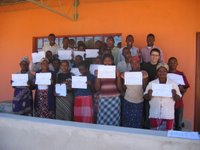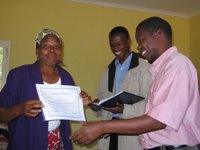Graduation Day
 On Friday morning we held a graduation ceremony for the 18 participants of the micro-enterprise training program that has taken place over the past two weeks (see Khongolote). The 18 new graduates, along with the trainers and myself, are pictured to the right. (Your challenge, should you choose to accept it, is to figure out which one is me. Hint: you can click on the photo to see a larger version.)
On Friday morning we held a graduation ceremony for the 18 participants of the micro-enterprise training program that has taken place over the past two weeks (see Khongolote). The 18 new graduates, along with the trainers and myself, are pictured to the right. (Your challenge, should you choose to accept it, is to figure out which one is me. Hint: you can click on the photo to see a larger version.)
It will take follow-up visits to all of these people in the coming weeks and months to really gain insight into the value of the program offered, but already I have seen some exciting fruit as participants' eyes were opened to simple business principles. One lady shared during the post-training evaluation that the most important realization that she made during the two weeks of training was the need to separate personal and business finances. This lady shared how this simple realization will improve her business: before this training session, she did not know how much profit she was earning from the sale of charcoal. She competed by offering the same product with the same terms of sale as her competitors. Now she realizes that she can sell her charcoal for a lower price, but insist that her clients pay right away rather than extending them credit. Under her old business model, her business was constrained because of a cash flow problem resulting from her receivables -- that is, because people paid for her product up to a month after having purchased it, she would not have sufficient cash to purchase her next lot of inventory for the rest of that month. Now she knows that by insisting her clients pay right away (and offering a lower price for doing so), she'll improve her cash flow and be able to turn her inventory three times faster.
One lady shared during the post-training evaluation that the most important realization that she made during the two weeks of training was the need to separate personal and business finances. This lady shared how this simple realization will improve her business: before this training session, she did not know how much profit she was earning from the sale of charcoal. She competed by offering the same product with the same terms of sale as her competitors. Now she realizes that she can sell her charcoal for a lower price, but insist that her clients pay right away rather than extending them credit. Under her old business model, her business was constrained because of a cash flow problem resulting from her receivables -- that is, because people paid for her product up to a month after having purchased it, she would not have sufficient cash to purchase her next lot of inventory for the rest of that month. Now she knows that by insisting her clients pay right away (and offering a lower price for doing so), she'll improve her cash flow and be able to turn her inventory three times faster.
It's also exciting to see the participants and trainers actively challenging and debating one another with respect to business implementation and improvement. One of the most clear examples of this resulted from the bank credit lecture given by a representative from Banco Oportunidade (Opportunity International). The participants challenged the bank's business model and interest rates, and provided suggestions to one another about credit options that might be superior. (We're going to investigate some of these options in the coming week.) Praise God that they are thinking critically about their options!
Sustainability
Some people have asked me why I'm not doing the training myself (after all, didn't I learn something in my MBA program that I could convey to African entrepreneurs?) This question strikes to the heart of my development philosophy, which thankfully is shared by my colleague, Glenn.
As a development practitioner, Christian missionary, foreigner -- whatever language is used -- the objective (in my view) should be to remain in the background and make oneself dispensable as quickly as possible. My role is as a mentor, a guide, an encourager, a facilitator -- but only where absolutely necessary as an up-front leader.
The key to creating a program that is sustainable is to ensure that it is lead from the outset by those it will benefit. The drawbacks of this approach, of course, are a bit of a loss of control over the ultimate direction of the program and perhaps an implementation that is slower than the breakneck speed that we are usually accustomed to. However, creating a program that is firmly in the grasp of Mozambicans will ensure that they buy into the concept, have the confidence and skills required to keep it going after we leave, and most importantly that they remain the masters of their own destiny.
My burden is to keep these values front-and-centre in my mind, since Laura and I are only staying for a year and we hope, in that year, to create some lasting change.

No comments:
Post a Comment